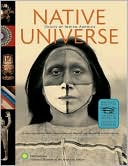

 |

|

The average rating for Native Universe: Voices of Indian America based on 2 reviews is 5 stars.
Review # 1 was written on 2014-08-18 00:00:00 Roger Elliott Roger ElliottMy favorite recent history book, Mann surveys the breadth and complexity of indigenous cultures in the Americas before the arrival of Columbus. Some of this research was familiar to me. When I taught American history in the 2000s, I would start with such 'snapshots' of Cahokia, the Olmecs, the Serpent Mound, the Maya, the great trade networks that connected the continent. But even that information was hard to find. Good luck finding even a mention of it in the school textbooks. Despite having some knowledge, I was blown away, again, by how populated and cultivated the American landscape was before the cataclysmic arrival of Europeans and their diseases. This book blows up many stubborn, out-dated theories like the singular Bering land-bridge migration, the idea that the land was 'mostly empty' when Europeans arrived, and the idea that most indigenous peoples were 'simple' hunter gatherers. It also gives us a good look at just how stubborn and resistant traditional Euro-American scholarship has been to accepting any new information that didn't fit established theories about the indigenous peoples. None of this will comes as a surprise to indigenous readers themselves, I'm sure, but for me, it was a refreshing, amazing read. I knew nothing about the vast, sophisticated terraforming societies of sub-Amazonian South America, or the pre-Incan empires, or the way that hunter-gatherer people intentionally crafted the landscape to better serve their needs. Mann gave me a tantalizing glimpse into a complex, beautiful pre-Columbian world. |
Review # 2 was written on 2004-10-11 00:00:00 P M S Dawson P M S DawsonThe survey of current thinking on the population of the americas via that Beringia land bridge and the subsequent summary of the evolutions of early american society is interesting. But the repeated comparisons between american society and eurasian society are really fraught and often belabored. The comparisons between the two hemisphere's agriculture and domesticable animals are fine, but the assertion that Aztec (apparently it's more politically correct to call them Mexica) philosophy was as rich as medieval europe's is ludicrous, especially given that such a huge volume of Aztec codices have been preserved and deciphered. The Aztecs did some respectable philosophical work, but Mann's exaggerations aside, they didn't come close to rivaling the work done in ancient Greece, to say nothing of the subsequent 2,000 years of philosophy in Europe (with a nod towards Middle Eastern contributions as well) that took place between the death of Aristotle and the discovery of the new world. Today, it may be possible to take a mesoamerican philosophy course in some university departments, but there are very few (if any) lasting or novel contributions to the the broader discipline of philosophy to be found in Aztec (or Mayan, or Incan) philosophy. There's no shame in that: it has been said that all philosophy is but a footnote to Plato. So why feel the need to exaggerate and mislead readers by making politically correct assertions that have no basis in reality? Also, the distinction the author draws between guilt and responsibility (i.e. 'we' should not feel guilty that Cortes introduced smallpox and wiped out 95% of american indians, but 'we' have some responsibility for this) is way too underdeveloped to be taken seriously. I don't necessarily think that the discussion is even necessary, but it is not an uncommon discussion in US politics, and Mann consciously decides to wade into these waters. First, he never defines 'we,' though it seems he means whites of european descent residing in the new world (and maybe Europeans back in Europe who benefitted from mercantilism/colonialism? It's not clear). And then he never explains how responsibility can be justly divided among descendants; how someone of, say, direct Cortez lineage might have a different level of 'responsibility' than a descendant of an Irish family with no seafaring anscestors and no pedigree in the New World until the late 19th century. And if they have the same 'responsibility,' then does a modern day Chinese or Indian immigrant to the new world also have some responsibility? All unclear, and the absence of even any contemplation of these points leaves the book's attempts at constructing a morality of European/American Indian interaction disappointingly hollow. Mann decided the topic was worthy enough to merit some discussion; it is unfortunate he failed to do the topic any justice. |
CAN'T FIND WHAT YOU'RE LOOKING FOR? CLICK HERE!!!